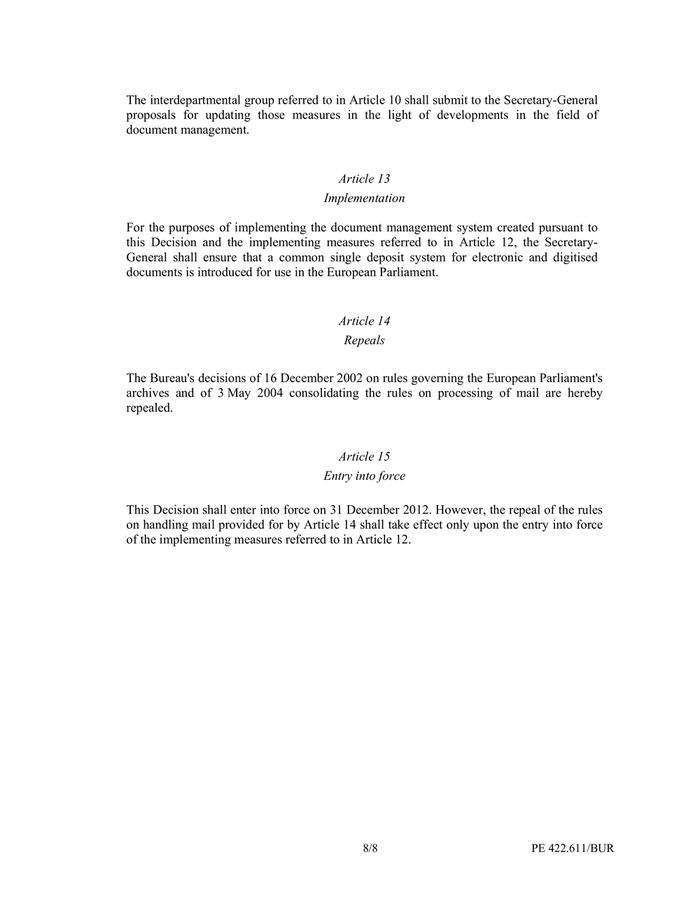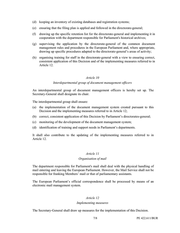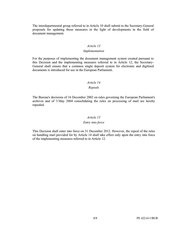3_20120702_dec_bur_en.pdf
Dieses Dokument ist Teil der Anfrage „Backup Strategy / Data Retention Audio-visual service“
7.3.2 RULES ON DOCUMENT MANAGEMENT IN THE EUROPEAN PARLIAMENT BUREAU DECISION OF 2 JULY 2012 THE BUREAU, - having regard to Council Regulation (EC, Euratom) No 354/1983 of 1 February 1983 concerning the opening to the public of the historical archives of the European 1 Economic Community and the European Atomic Energy Community , and in particular Article 9 thereof, - having regard to Rule 23(2) and the third subparagraph of Rule 104(2) of the European Parliament’s Rules of Procedure, WHEREAS: (1) The documents held by the European Parliament form part of its heritage and play a role in preserving its memory, facilitating the exchange of information, providing proof of operations carried out and meeting its legal obligations. Accordingly, effective document management rules are needed. (2) Rigorous, standardised document management will help to ensure compliance with the obligation of transparency, by furthering an effective policy of public access to Parliament’s documents, primarily through the electronic register of references (ERR) set up pursuant to the Bureau’s decision of 28 November 2001 laying down 2 rules governing public access to European Parliament documents . (3) The Union's institutions are required to draw up internal rules pursuant to Regulation (EC) No 354/1983. (4) An effective document management policy entails the adoption of rules covering the entire life cycle of a given document. The existing rules in this regard need to be rationalised and recast. (5) The objective of effective management policy should be attained by following good practice in the area, as called for by Parliament in its resolution of 14 March 2002 on the implementation of Regulation (EC) No 1049/2001 on public access to European 3 Parliament, Council and Commission documents . (6) The implementation of the rules needed to cover the documents’ life cycle requires a sound organisational structure, appropriate staff training, a modern document management system and, in particular, a single deposit system for electronic and digitised documents. The registration of a document will thus enable it to be kept on a long-term basis in Parliament's documentary resources. (7) An effective mail management system plays an essential role in document management within the European Parliament. 1 OJ L 43, 15.2.1983, p. 1. 2 Revised version published in OJ C 216, 22.7.2011, p. 19. 3 OJ C 47 E, 27.2.2003, p. 483. PE 422.611/BUR

(8) At its meeting on 16 June 2009 the Bureau decided to restructure the departments directly responsible for document management, by thus determining the synergies needed for the modernisation of document management. An administrative working party was set up, with the task of putting forward proposals for new, simpler and more consistent rules likely to lead to better integration of the sections concerned. (9) All departments in the General Secretariat should play a significant role in the application, coordination and overseeing of the new document management structure. (10) When the new structure is implemented, Parliament should ensure protection of privacy, the integrity of the individual and personal data, and protection of the commercial interests of third parties. (11) The new document management structure should be without prejudice to the specific rules for handling confidential information applicable in the European Parliament. (12) Implementation of the new structure should not apply to documents held by Members or the political groups unless they have been deposited in accordance with Parliament’s Rules of Procedure, HAS DECIDED AS FOLLOWS: Article 1 Objective and scope 1. This Decision lays down the document management rules applicable throughout the European Parliament, and aims in particular to ensure: (a) the due creation, receipt and preservation of documents; (b) the management of mail within the European Parliament; (c) the identification of each document by means of appropriate codes that facilitate filing, finding and consulting the document; (d) the creation of files in accordance with a filing plan; (e) preservation of the European Parliament’s memory; (f) retention of proof of Parliament's activities with a view to establishing that its legal obligations have been complied with; (g) the operational exchange of information within Parliament; and (h) compliance with Parliament’s transparency obligations. 2. This Decision shall apply to the registration, filing, preservation and depositing in the European Parliament's historical archives of documents in accordance with their life cycle, and to entry in the electronic register of references (ERR). This Decision does not apply to documents held by Members or by political groups that have not been tabled in accordance with Parliament’s Rules of Procedure. 2/8 PE 422.611/BUR

This Decision shall apply without prejudice to the specific rules governing the handling by Parliament of confidential information. Article 2 Definitions For the purposes of this Decision the following definitions shall apply: (a) "accessibility": the availability of documents for consultation in accordance with the rules in force; (b) "archives": a collection of documents, kept in files, to be preserved by Parliament and its directorates-general in the framework of their activities, either for a limited period of time (current archives and intermediate archives) or permanently (historical archives); (c) "filing": the operation whereby documents are identified and ordered in categories following a classification system; (d) "life cycle of a document": all the stages or periods in the life of a document from the time it is drawn up or received until it is destroyed in accordance with the rules or transferred to the historical archives and possibly made accessible to the public; (e) "directorate-general": a directorate-general or equivalent administrative body in Parliament’s General Secretariat; (f) "document": any content written on paper or stored in electronic form or as a sound, visual or audiovisual recording that is drawn up or received by the European Parliament, by one of its representatives or by a member of its staff in the performance of his or her duties and that concerns the activities of the European Parliament; (g) "file": the core around which the documents are organised in line with the European Parliament’s activities; (h) "administrative retention period": the period of time following the closure of a file for which the directorate-general concerned is required to preserve it on the basis of its administrative needs and the associated legal requirements; (i) "registration": the operation whereby documents drawn up or received by the European Parliament can be identified using a single reference. It constitutes the first stage in the process of ensuring the traceability of a document throughout its life cycle; (j) "filing plan": a structure made up of a number of interlinked headings at several hierarchical levels, allowing for the intellectual organisation of Parliament’s files on the basis of its activities; (k) "electronic register of references (ERR)": the electronic register of references referred to in Article 11 of Regulation (EC) No 1049/2001 of the European Parliament and of the Council of 30 May 2001 on public access to European Parliament, Council and 4 Commission documents and Article 1 of the Bureau decision of 28 November 2001; 4 OJ L 145, 31.5.2001, p. 43. 3/8 PE 422.611/BUR

(l) "appraisal": the process of separating the documents that are to be permanently preserved from those that are to be destroyed. Article 3 Registration As soon as a document is formally drawn up or received in the European Parliament, it shall be analysed with a view to determining whether it must be registered. A document must be registered if: (a) it contains important information that is not short-lived, and (b) it binds the European Parliament or may require action or follow-up by the European Parliament. Documents that have been drawn up within Parliament shall be registered by the originating department. Documents received by Parliament shall be registered by the department responsible for receipt of the document in question. Article 4 Filing Registered documents shall be organised in files. Each file must contain at least all documents registered that relate to an activity or a specific matter, in such a way that all the documents relating to the activity or matter in question can be easily identified. The Secretary-General shall draw up a filing plan for the whole of the European Parliament, taking account of the specific requirements of the various departments. The creation of a file and its inclusion in the filing plan shall be the responsibility of the department responsible for the area to which the file relates. 4/8 PE 422.611/BUR

Article 5 Preservation of current and intermediate archives Each directorate-general shall ensure the physical protection of the files created and held in the context of its activities and shall guarantee the accessibility of those files until such time as they are destroyed or transferred to the historical archives. Open files constitute the current archives of each directorate-general. Closed files constitute the intermediate archives of the directorates-general. Each directorate-general shall preserve its closed files throughout the administrative retention period, in accordance with its specific retention list. Article 6 Common retention list and specific retention lists The common retention list is the European Parliament’s regulatory instrument defining, for the whole of the European Parliament, which documents and files are to be retained and which have no archival interest. To that end, it sets the conditions and periods for their retention, including in particular the administrative retention period, the action to be taken and the stakeholders involved and their responsibilities. The common retention list shall be drawn up by decision of the Secretary-General. The specific retention list constitutes the regulatory instrument at the level of each directorate-general. It lays down, for the directorate-general concerned, the procedures, actions and periods ensuing from the implementation of the common retention list. The specific retention list shall be drawn up by each directorate-general in cooperation with the department responsible for the historical archives and after consulting the department responsible for access to documents, at the latest within one month from the entry into force of this Decision. Each directorate-general shall ensure that its specific retention list is in conformity with the common retention list. However, pending the drawing-up of the common retention list, each directorate-general shall draw up its specific retention list on the basis of its particular type or types of documents. Article 7 Appraisal and transfer to the historical archives of the European Parliament Each directorate-general shall carry out an appraisal of its intermediate archives in accordance with the procedures, actions and periods laid down in its specific retention list. Upon completion of that appraisal, the directorate-general shall transfer the documents and files selected for permanent preservation to the department responsible for Parliament's historical archives and shall destroy those that have, for the European Parliament, no historical value within the meaning of Regulation (EC, Euratom) No 354/83. 5/8 PE 422.611/BUR

The transfer to Parliament's historical archives shall be carried out in agreement with the department responsible for those archives. Article 8 Permanent preservation and accessibility of documents transferred to the historical archives of the European Parliament The aim of the permanent preservation of documents and files transferred to Parliament's historical archives pursuant to Article 7 shall be: (a) to preserve the historical memory of the European Parliament; (b) to make documents available within the European Parliament; (c) to open Parliament's historical archives to the public as required by Regulation (EC) No 354/83 and to deposit documents in the Historical Archives of the European Union. To that end, the department responsible for Parliament's historical archives shall have the following responsibilities: (a) preserving the documents transferred to Parliament's historical archives by means of appropriate tools guaranteeing their integrity and legibility over time; (b) making the documents available to Parliament’s departments for internal purposes and to the department responsible for public access to documents, in the event of a request from members of the public under Regulation (EC) No 1049/2001; (c) ensuring that the documents are accessible, particularly to researchers and historians, by putting in place tools that facilitate online access to information and any other means of documentary or academic dissemination or publishing. Article 9 Document management officers Each directorate-general shall designate a document management officer. The document management officer shall be responsible for setting up the new document management structure, and in particular: (a) identifying the types of document and the files specific to the directorate-general’s areas of activity; (b) drawing up an inventory of the types of documents and files that may be entered in and/or transferred to the electronic register of references (ERR); (c) making available documents which have been drawn up or received within the framework of the areas of competence of the directorate-general and which are asked for by the department responsible for public access to documents, accompanying the documents in question with an opinion on the follow-up action to be taken; 6/8 PE 422.611/BUR

(d) keeping an inventory of existing databases and registration systems; (e) ensuring that the filing plan is applied and followed in the directorate-general; (f) drawing up the specific retention list for the directorate-general and implementing it in cooperation with the department responsible for Parliament's historical archives; (g) supervising the application by the directorate-general of the common document management rules and procedures in the European Parliament and, where appropriate, drawing up specific procedures adapted to the directorate-general’s areas of activity; (h) organising training for staff in the directorate-general with a view to ensuring correct, consistent application of this Decision and of the implementing measures referred to in Article 12. Article 10 Interdepartmental group of document management officers An interdepartmental group of document management officers is hereby set up. The Secretary-General shall designate its chair. The interdepartmental group shall ensure: (a) the implementation of the document management system created pursuant to this Decision and the implementing measures referred to in Article 12; (b) correct, consistent application of this Decision by Parliament’s directorates-general; (c) monitoring of the development of the document management system; (d) identification of training and support needs in Parliament’s departments. It shall also contribute to the updating of the implementing measures referred to in Article 12. Article 11 Organisation of mail The department responsible for Parliament's mail shall deal with the physical handling of mail entering and leaving the European Parliament. However, the Mail Service shall not be responsible for franking Members’ mail or that of parliamentary assistants. The European Parliament’s official correspondence shall be processed by means of an electronic mail management system. Article 12 Implementing measures The Secretary-General shall draw up measures for the implementation of this Decision. 7/8 PE 422.611/BUR

The interdepartmental group referred to in Article 10 shall submit to the Secretary-General proposals for updating those measures in the light of developments in the field of document management. Article 13 Implementation For the purposes of implementing the document management system created pursuant to this Decision and the implementing measures referred to in Article 12, the Secretary- General shall ensure that a common single deposit system for electronic and digitised documents is introduced for use in the European Parliament. Article 14 Repeals The Bureau's decisions of 16 December 2002 on rules governing the European Parliament's archives and of 3 May 2004 consolidating the rules on processing of mail are hereby repealed. Article 15 Entry into force This Decision shall enter into force on 31 December 2012. However, the repeal of the rules on handling mail provided for by Article 14 shall take effect only upon the entry into force of the implementing measures referred to in Article 12. 8/8 PE 422.611/BUR








